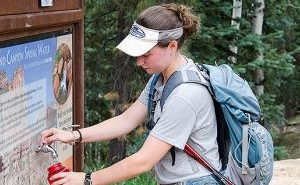By Scott Streater, Greenwire.
The National Park Service has ended a controversial Obama-era policy that encouraged national parks to ban the sale of plastic water bottles in the name of reducing litter and trash.
The announcement late yesterday will affect 23 national parks, including Grand Canyon, that have implemented bans on plastic water bottles since the policy encouraging the use of refillable water bottles went into effect in 2011.
NPS said in a statement that rescinding the ban is part of its “commitment to providing a safe and world-class visitor experience.” Allowing the sale of disposable water bottles at park sites will “expand hydration options for recreationalists, hikers, and other visitors to national parks,” the Park Service said.
The statement noted that bottled water bans at the 23 park sites “removed the healthiest beverage choice at a variety of parks while still allowing sales of bottled sweetened drinks,” particularly sodas.
“While we will continue to encourage the use of free water bottle filling stations as appropriate, ultimately it should be up to our visitors to decide how best to keep themselves and their families hydrated during a visit to a national park, particularly during hot summer visitation periods,” Michael Reynolds, NPS’s acting director, said in a statement.
The water beverage industry, which has long argued that bottled water does not deserve to be singled out, said axing the policy was long overdue.
“The rescinded policy was seriously flawed,” said Jill Culora, a spokeswoman for the International Bottled Water Association, a trade group that counts some of the largest bottled water makers as members.
“It was established to reduce waste left behind by park visitors, but people coming to the parks that banned the sale of bottled water were still allowed to buy other less healthy beverages — including carbonated soft drinks, sports drinks, teas, milk, beer and wine — that are packaged in much heavier plastic, glass, cans and cardboard containers,” she added.
Rescinding the policy “recognizes the importance of making safe, healthy, convenient bottled water available to the millions of people from around the world who want to stay well-hydrated while visiting national parks. Consumption of water in all forms — tap, filtered and bottled — should always be encouraged,” Culora said.
It’s the latest Obama-era policy to be cut by the Trump administration.
The push to encourage national parks to ban water bottles was part of President Obama’s Green Parks Plan, which focused mostly on NPS reducing emissions of gases linked to climate warming. But the plan also originally called for 75 percent of national parks to go bottled-water-free by 2016 — a goal the Park Service later scaled back.
A water bottle ban initiated in 2012 at Grand Canyon National Park was controversial but necessary, according to the Park Service, which estimated at the time that plastic water bottles accounted for as much as 30 percent of the park’s trash.
Greens decry lobbying interests behind rollback
Environmental groups are blasting the reversal and are denouncing lobbying interests they say were behind the move.
“Actions that rollback protections on our National Parks and public lands only move our country backward — putting the importance of local economies, wildlife and communities on the back burner,” Athan Manuel, the Sierra Club’s public lands policy director, said in a statement. “The reversal is but a symbol for this administration’s larger attacks on environmental safeguards and protection of public lands.”
Rescinding the ban is another example of the Trump administration bending policies to benefit corporate interests, said Jesse Bragg, a spokesman for Corporate Accountability International.
“This policy was a win-win for everyone except for the bottled water industry,” Bragg said. “Not only did this policy reduce the waste stream, which was the goal of the Park Service, but it also provided for an opportunity to invest in universal access for water at parks via hydration stations.”
Bragg said the lobbying arm of Deputy Interior Secretary David Bernhardt’s former law firm, Brownstein Hyatt Farber Schreck LLP, lobbied on behalf of Nestlé Waters North America, a major bottled water producer and distributor of such brands as Arrowhead, Deer Park and Ozarka.
“The only argument against this policy is the profits for the bottled water industry, and that kind of argument works in the Trump administration,” he said.
The International Bottled Water Association spent hundreds of thousands of dollars since 2011 to lobby members of Congress to change the policy (Greenwire, July 13, 2015).
Congress attempted in 2015 and 2016 to insert language in spending bills for U.S. EPA and the Interior Department that would prohibit NPS from banning bottled water sales.
Now that the policy has been rescinded, NPS says parks will continue to promote recycling of disposable plastic water bottles. Many parks, NPS said, have already worked with partners to provide free potable water in bottle filling stations located at visitor centers and near trailheads.




